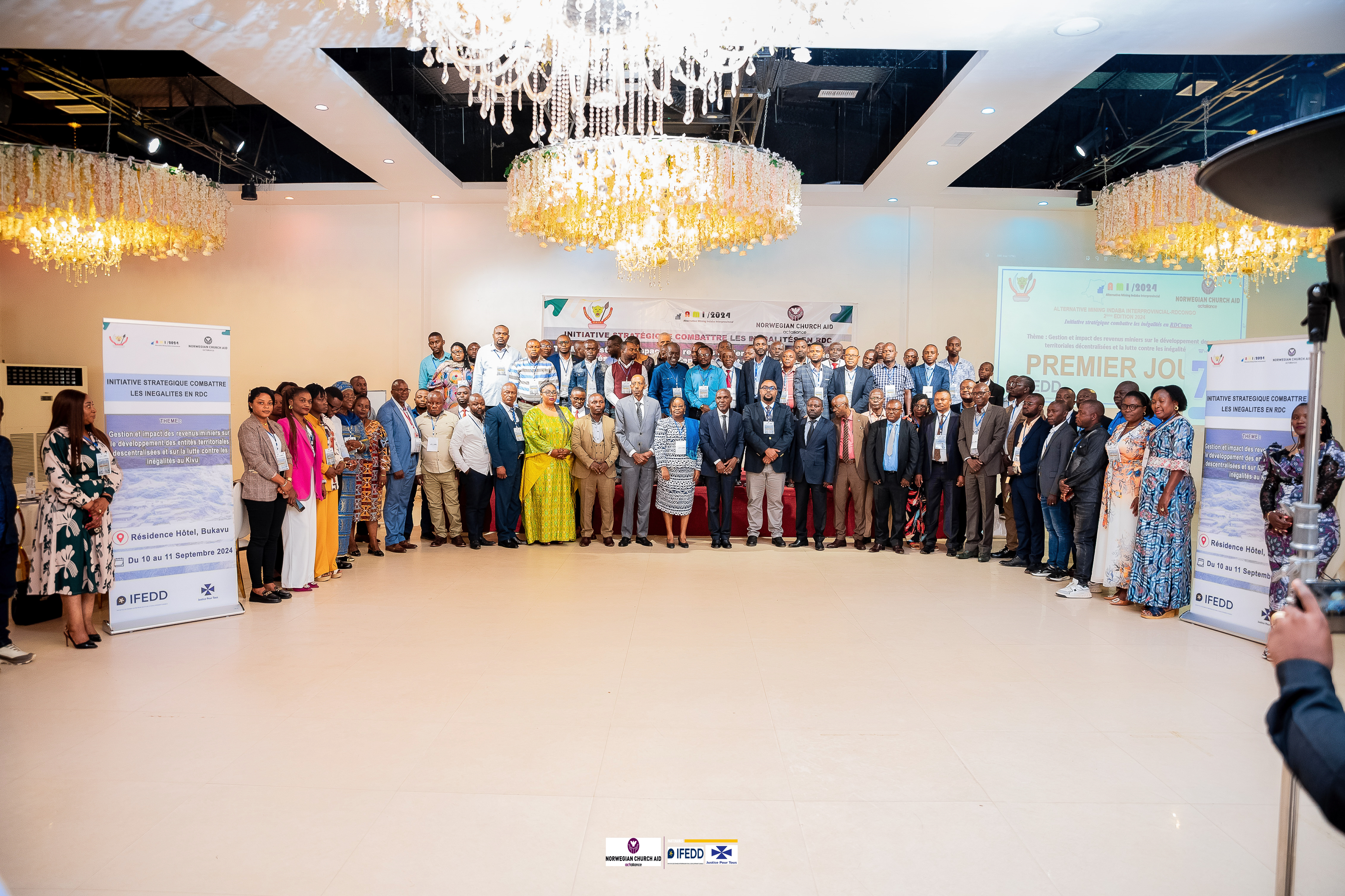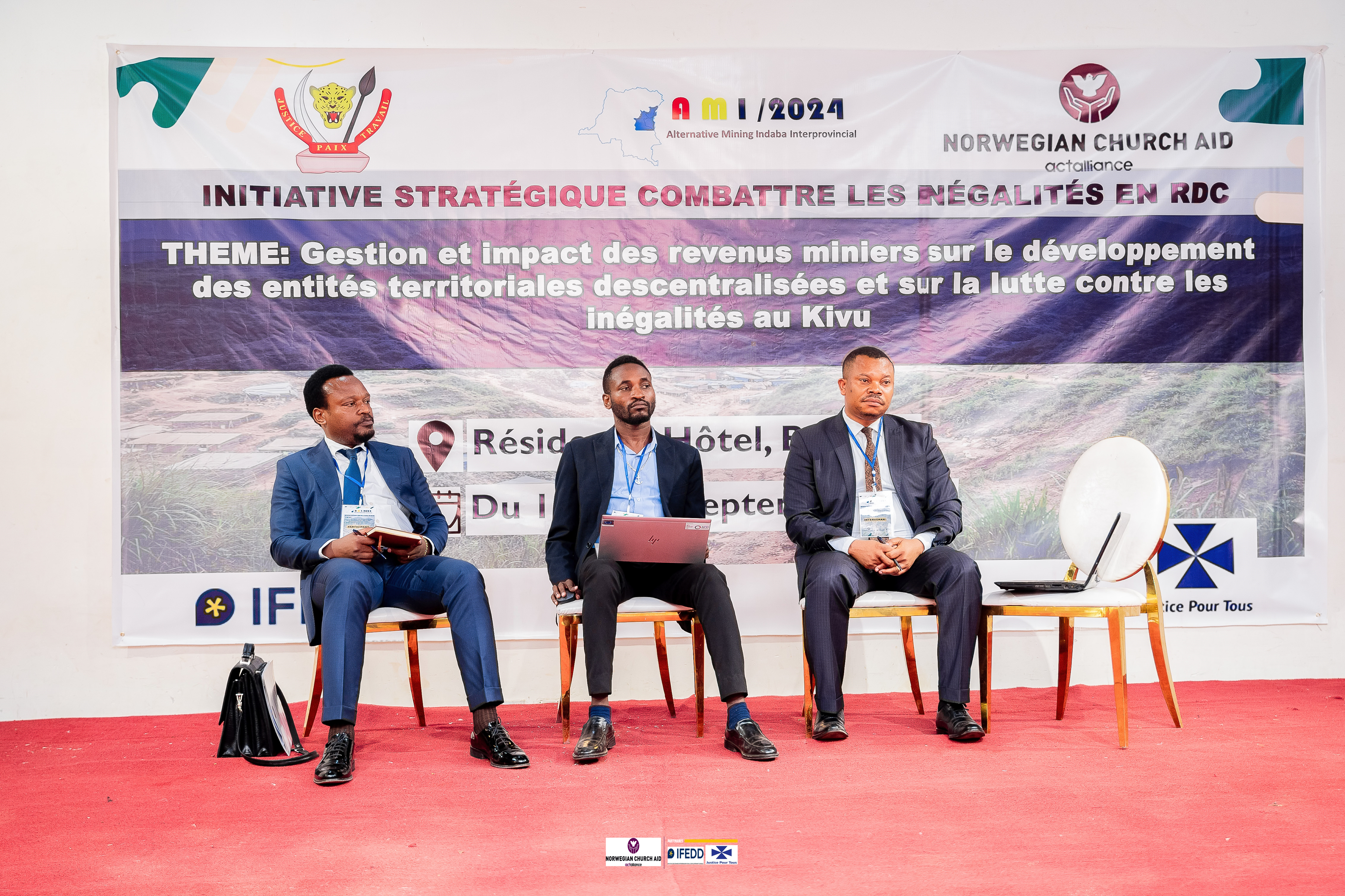The Mining Indaba Interprovincial Alternative Conference, organized by Norwegian Church Aid (NCA) in collaboration with Initiatives des Femmes Entrepreneurs pour le Développement Durable et Justice pour Tous, took place in the Democratic Republic of Congo (DRC) from September 10 to 11, 2024.
Written by Augustin Bashi. Published 24.09.2024.

The conference centered on the theme: “Management and Impact of Mining Revenues on the Development of Decentralized Territorial Entities and the Fight Against Inequalities in Kivu.”
Objectives and Participants
This significant gathering brought together a diverse group of stakeholders, including provincial authorities from North and South Kivu, civil society representatives, local community members impacted by mining projects, mining investors, and international development partners. The primary objective was to explore the implications of mining revenue management on local development and inequality.
Key Discussions and Panels
Over two days, six panels facilitated in-depth discussions on critical topics related to mining and its socio-economic impacts:
- Mines, Decentralization, and Grassroots Development: This panel emphasized the need for stringent application of the mining code and procedures for granting mining rights. Despite existing regulations, enforcement remains inadequate. Recommendations included improving the availability of geological studies to attract investment and ensuring that decentralized territorial entities (ETDs) benefit from a 0.3% mining royalty on company turnover.
- Legal Framework and Mining Revenues: The necessity for regular updates to legal texts governing mining taxes was highlighted, ensuring ETDs can fully capitalize on revenues. A lack of cooperation between mining administration and revenue collection agencies was identified as a barrier to effective revenue mobilization, necessitating enhanced transparency in resource management.
- ETD Experiences in Mining Revenue Management: Although ETDs receive 40% of provincial mining revenues, funds are often misallocated. The panel called for civil society's active involvement in developing and implementing mining projects, emphasizing the need for effective governance frameworks.
- Industrial vs. Artisanal Mining: Discussions centered on the mining value chain, addressing challenges related to transparency and verification of resources. The panel recommended adopting electronic governance standards to enhance tax collection and administrative efficiency, recognizing artisanal mining’s critical role in local development.
- Corruption and Revenue Mobilization: The ongoing issues of corruption and mismanagement in the mining sector were underscored, with local communities often missing out on the benefits of mineral wealth due to fraudulent practices. Solutions included bolstering oversight and accountability measures.
- Women in Mining: This panel recognized women’s vital role within the mining supply chain and their involvement in governance. Their engagement in mining monitoring committees is encouraged, as civil society aims to leverage this participation for equitable development in mining regions.
Working Group Discussions

Following the panels, discussions from September 11 to 12 focused on pressing issues in the mining sector:
- Group 1 addressed child labor and sexual exploitation, attributing these issues to ignorance of local laws and lack of economic opportunities. They proposed raising awareness of the mining code and enhancing women’s empowerment in agriculture as solutions.
- Group 2 explored the potential of artisanal mining to support ETD development. They emphasized the need for transparency and community engagement, concluding that well-regulated artisanal mining could drive local development by creating jobs and reducing poverty.
- Group 3 focused on mineral traceability to support community development. They stressed strict adherence to legal procedures and recommended improving oversight of artisanal miners to maximize mining revenues for infrastructure development.
Conclusion
The Mining Indaba Interprovincial Alternative Conference highlighted the complexities and challenges of mining revenue management in Kivu. It underscored the importance of collaboration among stakeholders to ensure that mining contributes positively to local development while addressing inequalities. Through active engagement and rigorous governance, there is potential for mining to become a catalyst for sustainable growth in the region.


